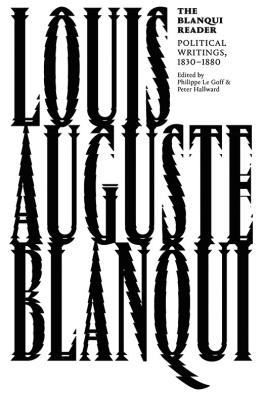Louis Auguste Blanqui - The Blanqui Reader
Here you can read online Louis Auguste Blanqui - The Blanqui Reader full text of the book (entire story) in english for free. Download pdf and epub, get meaning, cover and reviews about this ebook. publisher: Penguin Random House LLC (Publisher Services), genre: Politics. Description of the work, (preface) as well as reviews are available. Best literature library LitArk.com created for fans of good reading and offers a wide selection of genres:
Romance novel
Science fiction
Adventure
Detective
Science
History
Home and family
Prose
Art
Politics
Computer
Non-fiction
Religion
Business
Children
Humor
Choose a favorite category and find really read worthwhile books. Enjoy immersion in the world of imagination, feel the emotions of the characters or learn something new for yourself, make an fascinating discovery.
- Book:The Blanqui Reader
- Author:
- Publisher:Penguin Random House LLC (Publisher Services)
- Genre:
- Rating:4 / 5
- Favourites:Add to favourites
- Your mark:
- 80
- 1
- 2
- 3
- 4
- 5
The Blanqui Reader: summary, description and annotation
We offer to read an annotation, description, summary or preface (depends on what the author of the book "The Blanqui Reader" wrote himself). If you haven't found the necessary information about the book — write in the comments, we will try to find it.
The Blanqui Reader — read online for free the complete book (whole text) full work
Below is the text of the book, divided by pages. System saving the place of the last page read, allows you to conveniently read the book "The Blanqui Reader" online for free, without having to search again every time where you left off. Put a bookmark, and you can go to the page where you finished reading at any time.
Font size:
Interval:
Bookmark:

The Blanqui Reader
The Blanqui Reader
Political Writings, 18301880
Louis Auguste Blanqui
Edited by Philippe Le Goff and Peter Hallward
Translated by Philippe Le Goff,
Peter Hallward and Mitchell Abidor

First published by Verso 2018
Collection Philippe Le Goff and Peter Hallward 2018
Translations Philippe Le Goff, Peter Hallward and Mitchell Abidor 2018
All rights reserved
The moral rights of the authors have been asserted
1 3 5 7 9 10 8 6 4 2
Verso
UK: 6 Meard Street, London W1F 0EG
US: 20 Jay Street, Suite 1010, Brooklyn, NY 11201
versobooks.com
Verso is the imprint of New Left Books
ISBN-13: 978-1-78663-501-3
ISBN-13: 978-1-78663-502-0 (UK EBK)
ISBN-13: 978-1-78663-503-7 (US EBK)
British Library Cataloguing in Publication Data
A catalogue record for this book is available from the British Library
Library of Congress Cataloging-in-Publication Data
A catalog record for this book is available from the Library of Congress
Typeset in Minion Pro by Hewer Text UK Ltd, Edinburgh
Printed and bound by CPI Group (UK) Ltd, Croydon, CRO 4YY
Antiquity attributed to Hercules every great heroic feat; the reactionaries see in me the personification of every crime and every atrocity.
Blanqui, defence speech, in Haute
Cour Nationale de justice sant Bourges, 1849
The duty of a revolutionary is always to struggle, to struggle no matter what, to struggle to extinction.
Blanqui, Instructions pour une prise darmes, 1868
We must not try to take giant leaps, but only human steps, and to keep walking, always.
Blanqui, speech given in Milan, November 1880
Contents
| CS1, CS2 | Critique Sociale (Paris: Flix Alcan, 1885), 2 vols. |
| MF | Maintenant, il faut des armes, ed. Dominique Le Nuz (Paris: La Fabrique, 2007). |
| MSS | Manuscript volume, catalogued as NAF 95789598 (Paris, Bibliothque Nationale, manuscript collections). |
| NDNM | Ni Dieu ni matre (Brussels: ditions Aden, 2009). |
| OI | uvres I: Des origines la Rvolution de 1848, ed. Dominique Le Nuz (Nancy: Presses Universitaires de Nancy, 1993). |
| TC | Textes choisis, ed. V.P. Volguine (Paris: ditions Sociales, 1956). |
| 1804 | Napoleon is crowned emperor. |
| 1805 | Louis Auguste Blanqui is born in the small provincial town of Puget-Thniers, near Nice. His father Jean Dominique Blanqui had served as a Girondin member of the Constituent Assembly in 179293, and was later appointed sub-prefect of the Alpes Maritimes department by Napoleon. |
| 1815 | Napoleon is overthrown, and the Bourbon Louis XVIII is restored as king; he is replaced by his younger brother Charles X in 1824. |
| 1822 | Shortly before finishing his secondary education in Paris at the Lyce Charlemagne, Blanqui witnesses the execution in Paris of four seditious soldiers, the four sergeants of la Rochelle, all members of the secret society La Charbonnerie. |
| 1827 | Blanqui is wounded during clashes with government troops in April and May, and then almost killed on 19 November by a bullet wound to the neck during further protests around the Rue Saint-Denis, in Paris. In a short autobiographical sketch he will remember the November protest as the day when he rediscovered the people of the first Revolution, with their heroic rags, their bare arms, their improvised weapons, their indomitable courage and their irresistible anger. |
| 1829 | Blanqui begins working as a stenographer with Le Globe, a prom- inent liberal newspaper associated with moderate opposition to the Bourbon regime, edited by the Saint-Simonian Pierre Leroux. |
| 1830 | Blanqui participates in the massive July Days insurrection, which forces Charles X to abdicate; he is replaced by Louis-Philippe (son of the former Duc dOrlans) as a constitutional monarch, presiding over a government dominated by bankers and financiers. |
| 1831 | First insurrection of the Canuts (silk workers) in Lyon. Blanqui is arrested and charged, along with fourteen other members of the Socit des Amis du Peuple, for plotting against the state, and for press violations. |
| 1834 | Second Canut insurrection, followed by riots in Paris and other cities. With Armand Barbs, Blanqui becomes the leading figure in a small conspiratorial society, the Socit des Familles, and publishes the first and only issue of the newspaper LeLibrateur: Journal des opprims. He marries Amlie-Suzanne Serre (b. 1814), one of his former pupils. |
| 1836 | Blanqui and other members of the Socit des Familles are imprisoned for the illegal possession of arms and the manufacture of gunpowder. |
| 1837-39 | Blanqui helps organise a new and more disciplined conspirato- rial group, the Socit des Saisons. |
| 1839 | On 12 May, Blanqui and Barbs lead the Socit des Saisons in a failed insurrection, which is crushed after two days of street battles; like the other leaders of the coup attempt, Blanqui is condemned to life in prison. |
| 184047 | Blanqui endures extremely harsh conditions in the prison of Mont Saint-Michel, and almost dies in a prison hospital in Tours. In 1841, Blanquis wife Amlie-Suzanne becomes ill and dies, at the age of twenty-six; Blanqui is heartbroken and never remarries. |
| 1848 | In February, a popular uprising overthrows the Orlanist monarchy, and leads to the establishment of a relatively moderate republic. From early March to mid May, Blanqui leads an influential political club, the Socit Rpublicaine Centrale. The government tries to discredit him, in April, by publishing the Taschereau Document, which claims he betrayed his comrades of May 1839. He is arrested shortly after a failed march on the National Assembly, on 15 May, and then imprisoned in Vincennes. He remains in prison for the next ten years. |
| 1849 | Blanqui is imprisoned in Doullens, and then moved on to Belle-le. |
| 1851 | President Bonaparte seizes power in a coup dtat, and a year later becomes emperor Napoleon III. |
| 1859 | Blanqui is finally liberated, as part of a general amnesty, and begins to focus on clandestine journalism and propaganda. |
| 1861 | Blanqui is again arrested, on charges of conspiracy and sedition, and imprisoned at Sainte-Plagie, in Paris, where he influences a new generation of radicals. |
| 1865 | Blanqui escapes from a prison hospital and goes into exile in Brussels. From 1865 through to 1870, a small but organised Blanquist party begins to take shape, as Le Vieux (the old man) wins over new support in student and workers circles, recruiting people who would soon play important roles in the Paris Commune of 1871. With Gustave Tridon, Blanqui edits the newspaper Candide; it publishes eight issues, with a circulation of around 10,000 copies, before the government closes it down. |
| 1869 | A general amnesty allows Blanqui to return to Paris; anti-government pressure grows. |
| 1870 | War with Prussia begins in July, and immediately goes badly for France. On 14 August, pressed by his more impatient followers, Blanqui reluctantly leads a futile and hastily arranged attempt at insurrection in north-eastern Paris. In early September, Napoleon III surrenders to Bismarck, and an emergency Government of National Defence is established, dominated by moderate republicans. Blanqui founds the newspaper and associated club |
Font size:
Interval:
Bookmark:
Similar books «The Blanqui Reader»
Look at similar books to The Blanqui Reader. We have selected literature similar in name and meaning in the hope of providing readers with more options to find new, interesting, not yet read works.
Discussion, reviews of the book The Blanqui Reader and just readers' own opinions. Leave your comments, write what you think about the work, its meaning or the main characters. Specify what exactly you liked and what you didn't like, and why you think so.










